Background
Mortimer Jerome Adler was born on December 28, 1902, in New York City. He was the son of Ignatz and Clarissa (Manheim) Adler.

Mortimer J. Adler
Mortimer J. Adler
Mortimer J. Adler
Mortimer J. Adler
Mortimer J. Adler
Mortimer J. Adler
Mortimer J. Adler
Mortimer J. Adler
5801 S Ellis Ave, Chicago, IL 60637, United States
Professor Mortimer J. Adler making a point during a round table discussion about great books in class at the University of Chicago.
Mortimer J. Adler
Mortimer J. Adler
New York, NY 10027, United States
Adler studied at Columbia University.

















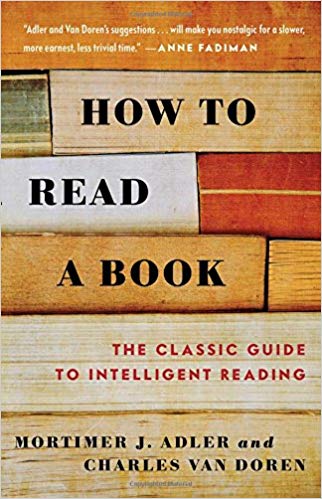
(With half a million copies in print, How to Read a Book i...)
With half a million copies in print, How to Read a Book is the best and most successful guide to reading comprehension for the general reader, completely rewritten and updated with new material.
https://www.amazon.com/How-Read-Book-Classic-Intelligent/dp/0671212095/?tag=2022091-20
1940
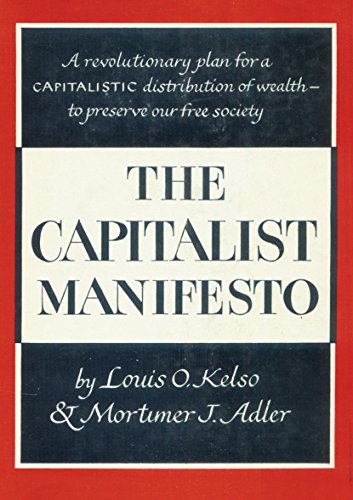
(In 1956, a U.S. lawyer-economist, Louis O. Kelso, created...)
In 1956, a U.S. lawyer-economist, Louis O. Kelso, created the employee stock ownership plan (ESOP) to enable the employees of a closely held newspaper chain to buy out its retiring owners. Two years later, Kelso and his co-author, the philosopher Mortimer J. Adler, explained the macro-economic theory on which the ESOP is based in this best-selling book, The Capitalist Manifesto.
https://www.amazon.com/Capitalist-Manifesto-Louis-Kelso-ebook/dp/B01N5SWFVR/?tag=2022091-20
1958
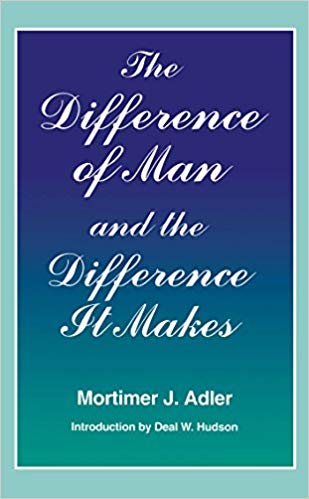
(In this classic work, Adler explores how man differs from...)
In this classic work, Adler explores how man differs from all other things in the universe, bringing to bear both philosophical insight and informed scientific hypotheses concerning the biological and behavioral characteristics of mainkind.
https://www.amazon.com/Difference-Man-Makes/dp/0823215350/?tag=2022091-20
1967
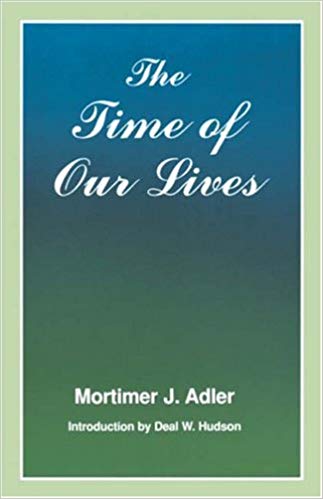
(Is it a good time to be alive? Is ours a good society to ...)
Is it a good time to be alive? Is ours a good society to be alive in? Is it possible to have a good life in our time? And finally, does a good life consist of having a good time? Are happiness and “a good life” interchangeable? These are the questions that Mortimer Adler addresses himself to. The heart of the book lies in its conception of the good life for man, which provides the standard for measuring a century, a society, or a culture: for upon that turns the meaning of each man’s primary moral right – his right to the pursuit of happiness.
https://www.amazon.com/Time-Our-Lives-Ethics-Common/dp/0823216705/?tag=2022091-20
1970
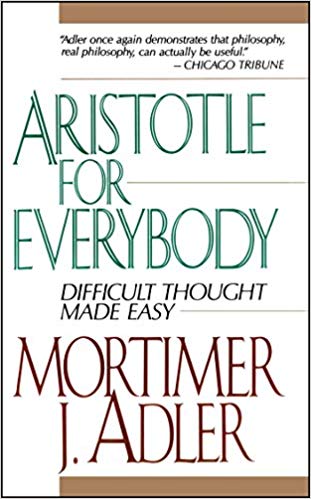
(Aristotle (384 - 322 B.C.) taught logic to Alexander the ...)
Aristotle (384 - 322 B.C.) taught logic to Alexander the Great and, by virtue of his philosophical works, to every philosopher since, from Marcus Aurelius, to Thomas Aquinas, to Mortimer J. Adler. Now Adler instructs the world in the "uncommon common sense" of Aristotelian logic, presenting Aristotle's understandings in a current, delightfully lucid way. He brings Aristotle's work to an everyday level. By encouraging readers to think philosophically, Adler offers us a unique path to personal insights and understanding of intangibles, such as the difference between wants and needs, the proper way to pursue happiness, and the right plan for a good life.
https://www.amazon.com/Aristotle-Everybody-Difficult-Thought-Made/dp/0684838230/?tag=2022091-20
1978
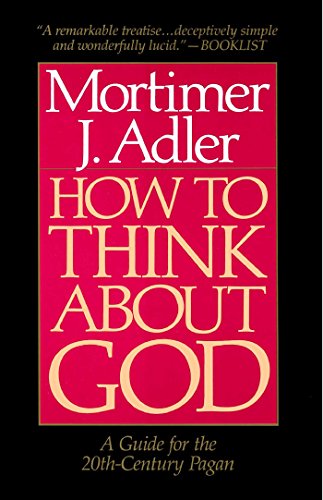
(Dr. Adler, in his discussion, extends and modernizes the ...)
Dr. Adler, in his discussion, extends and modernizes the argument for the existence of God developed by Aristotle and Aquinas. Without relying on faith, mysticism, or science (none of which, according to Dr. Adler, can prove or disprove the existence of God), he uses a rationalist argument to lead the reader to a point where he or she can see that the existence of God is not necessarily dependent upon a suspension of disbelief. Dr. Adler provides a nondogmatic exposition of the principles behind the belief that God, or some other supernatural cause, has to exist in some form. Through concise and lucid arguments, Dr. Adler shapes a highly emotional and often erratic conception of God into a credible and understandable concept for the lay person.
https://www.amazon.com/How-Think-About-God-20th-century-ebook/dp/B0030HKYUQ/?tag=2022091-20
1980
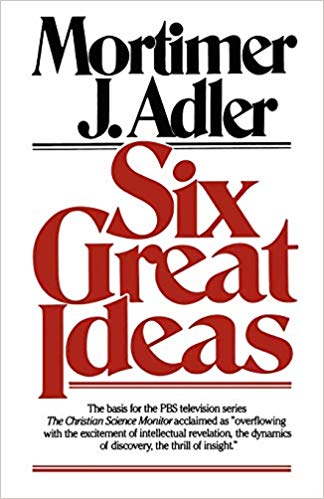
(Discusses complex philosophical problems in concrete lang...)
Discusses complex philosophical problems in concrete language to better understand the eternal concepts that shaped Western culture.
https://www.amazon.com/Six-Great-Ideas-Mortimer-Adler/dp/068482681X/?tag=2022091-20
1981

(Dr. Adler, the bestselling author of "Ten Philosophical M...)
Dr. Adler, the bestselling author of "Ten Philosophical Mistakes", "Aristotle for Everybody", and "The Great Ideas", speculates on the existence of angels; why Jews, Christians, and Muslims believe in angels, and the ways angels have been viewed as objects of religious belief and philosophical thought. This is a wonderfully enlightening work on the affinities between angels and human beings.
https://www.amazon.com/Angels-Us-Mortimer-J-Adler/dp/0020300654/?tag=2022091-20
1982

(Analyzes the purpose of public education in a democratic ...)
Analyzes the purpose of public education in a democratic society and recommends changes in American public schools designed to improve both the quality and equality of education.
https://www.amazon.com/Paideia-Proposal-Educational-Manifesto/dp/0684841886/?tag=2022091-20
1982

(The author elucidates the implications of twelve key idea...)
The author elucidates the implications of twelve key ideas--work, wealth, virtue, leisure, property, happiness, state, government, democracy, society, constitution, and citizenship--whose influence will shape the future.
https://www.amazon.com/Vision-Future-Mortimer-J-Adler/dp/0025002805/?tag=2022091-20
1984
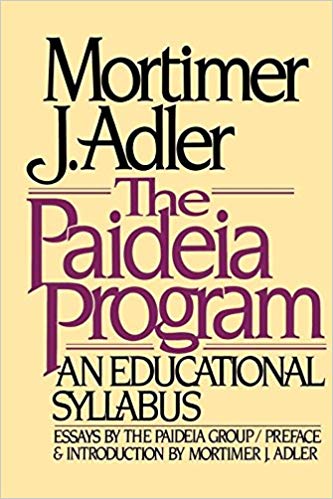
(Essays discuss seminars, tutoring, lectures, school struc...)
Essays discuss seminars, tutoring, lectures, school structure, and the teaching of English, math, science, history, social studies, foreign languages, and art.
https://www.amazon.com/Paideia-Program-Mortimer-J-Adler/dp/0020130406/?tag=2022091-20
1984
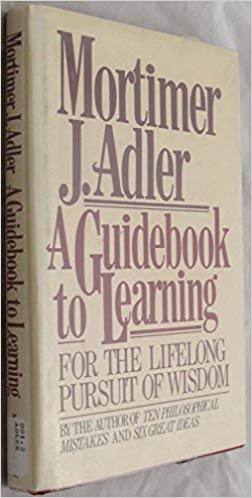
(A systematic approach to lifelong learning interconnects ...)
A systematic approach to lifelong learning interconnects disciplines and ideas, explains the shortcomings of specialization, shows how to assimilate information and knowledge into understanding and wisdom, and offers a defense of the liberal arts.
https://www.amazon.com/Guidebook-Learning-Lifelong-Pursuit-Wisdom/dp/0025003402/?tag=2022091-20
1986
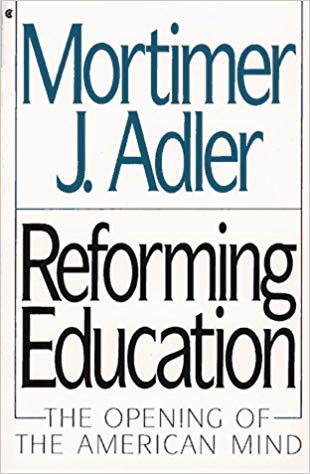
(A founder of the "great books" movement addresses the con...)
A founder of the "great books" movement addresses the controversy concerning what should be required study in schools and suggests a humanistic course of study that is accessible to all.
https://www.amazon.com/Reforming-Education-Opening-American-Mind/dp/0020301758/?tag=2022091-20
1988
Mortimer Jerome Adler was born on December 28, 1902, in New York City. He was the son of Ignatz and Clarissa (Manheim) Adler.
After reading the autobiography of a nineteenth-century English philosopher John Stuart Mill, Adler quit high school to direct his own education. He worked as a copyboy by the New York Sun, where he stayed for two years doing a variety of editorial work full-time and read Plato, Aristotle, Thomas Aquinas, John Locke, John Stuart Mill and others. On scholarship, he earned an undergraduate degree in philosophy at Columbia University in three years, but left without a diploma because he refused to complete the swimming requirement. In 1983, the university relented and awarded him the long-delayed Bachelor of Arts degree. While at Columbia, he contributed to the student literary magazine, The Morningside and wrote his first book: Dialectic, published in 1927.
After his graduation from Columbia University, Adler stayed there to teach and then became a professor of the philosophy of law at the University of Chicago. There, with Robert M. Hutchins, he became a proponent of the pursuit of liberal education through regular discussions based on reading great books. Adler was associated with Hutchins in editing the 54-volume Great Books of the Western World (1952) and conceived and directed the preparation of its two-volume index of great ideas, the Syntopicon.
In 1952 Adler became director of the Institute for Philosophical Research (initially in San Francisco and from 1963 in Chicago), which prepared The Idea of Freedom, 2 vol. (1958–61). With Hutchins, Adler edited for Encyclopædia Britannica, Inc., the 10-volume Gateway to the Great Books (1963) and from 1961 an annual, The Great Ideas Today.
Adler also headed the editorial staff of Britannica’s 20-volume Annals of America, which included a two-volume Conspectus, Great Issues in American Life (1968). Under the sponsorship of Britannica, he delivered several series of lectures at the University of Chicago that were published later as books: The Conditions of Philosophy (1965), The Difference of Man and the Difference It Makes (1967), and The Time of Our Lives (1970). In 1969 he became director of planning for the 15th edition of the Encyclopædia Britannica, published in 1974. He was chairman of the Encyclopædia Britannica’s Board of Editors from 1974 to 1995.
Mortimer Jerome Adler is known as a philosopher and popular author, who attempted to make philosophy easy to understand for the average person on the street. Adler helped establish the Great Books Foundation that encouraged people to meet in groups twice a month and talk about classic texts. He wrote nearly fifty books and two autobiographies. He also was a president and director for the Institute for Philosophical Research in San Francisco.
As the director of editorial planning for the fifteenth edition of Britannica from 1965, he was instrumental in the major reorganization of knowledge embodied in that edition. He introduced the Paideia Proposal which resulted in his founding the Paideia Program, a grade-school curriculum centered around guided reading and discussion of difficult works (as judged for each grade). With Max Weismann, he founded The Center for the Study of The Great Ideas.
(Is it a good time to be alive? Is ours a good society to ...)
1970(A systematic approach to lifelong learning interconnects ...)
1986(In this classic work, Adler explores how man differs from...)
1967(The author elucidates the implications of twelve key idea...)
1984(With half a million copies in print, How to Read a Book i...)
1940(A founder of the "great books" movement addresses the con...)
1988(Analyzes the purpose of public education in a democratic ...)
1982(Essays discuss seminars, tutoring, lectures, school struc...)
1984(Discusses complex philosophical problems in concrete lang...)
1981(Aristotle (384 - 322 B.C.) taught logic to Alexander the ...)
1978(In 1956, a U.S. lawyer-economist, Louis O. Kelso, created...)
1958(Dr. Adler, in his discussion, extends and modernizes the ...)
1980(Dr. Adler, the bestselling author of "Ten Philosophical M...)
1982Although Adler was not a Catholic, he can be considered a Catholic philosopher on account of his lifelong participation in the Neo-Thomist movement.
Central to Adler's philosophy was a rebuttal of the prevailing notions of educational philosopher John Dewey, who had taught him at Columbia. Opposed to Dewey's focus on experimentation and the free selection of values that are applicable to the times, Adler published articles and books charging that such a belief system produced shoddy, poorly prepared thinkers and precipitated social unrest.
As an admirer of Plato, Aristotle, and St. Thomas Aquinas, Adler believed there is no changing truth and values and viewed it as the job of a good education to impart those things. As the spokesman for a group of noted educators, he wrote, after considerable study and debate, The Paideia Proposal: An Educational Manifesto (1982) and The Paideia Program: An Educational Syllabus (1984), calling for the abolition in American schools of multitrack educational systems, arguing that a single elementary and secondary school program for all students would ensure the upgrading of the curriculum and the quality of instruction to serve the needs of the brightest and to lift the achievement of the least advantaged. He proposed that specialized vocational or preprofessional training be given only after students had completed a full course of basic education in the humanities, arts, sciences, and language.
Quotations: "Unlike many of my contemporaries, I never write books for my fellow professors to read. I have no interest in the academic audience at all. I'm interested in Joe Doakes. A general audience can read any book I write - and they do."
Mortimer Adler was a long member of the American Catholic Philosophical Association.
Mortimer Adler was married twice. In 1927, he married Helen Boynton but they divorced in 1960. The marriage produced two children, Mark and Michael. His second wife was Carolyn Pring. They married in 1963. The marriage was blessed with two children. In 1998 Carolyn died.

1895 – 1968
Scott Buchanan was an American philosopher, educator, and foundation consultant. He is best known as the founder of the Great Books program at St. John's College, at Annapolis, Maryland.

Born on November 20, 1949
Deal Wyatt Hudson is an American conservative political activist. Hudson is a former publisher and editor of Crisis Magazine and InsideCatholic.com from 1996-2011.
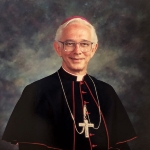
August 2, 1931 – June 13, 2019
Roland Pierre DuMaine was an American Roman Catholic bishop. He was the Bishop of San José in California for the first 18 years of the diocese.
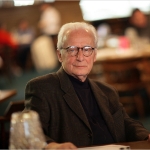
February 24, 1929 – January 29, 2010
Ralph Matthew McInerny was an American author and Professor of Philosophy at the University of Notre Dame. McInerny's most popular mystery book series featured Father Dowling.
